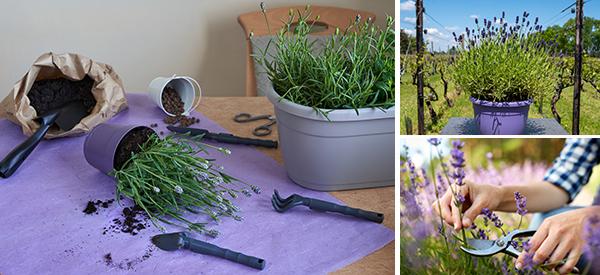
How To Grow Your Own Lavender From Cuttings
Once established, lavender is super hardy and can handle a bit of neglect (such as forgetting to water it occasionally). Luckily, lavender is relatively easy to grow from cuttings, especially compared to germinating lavender seed, which so far, I haven’t had any success with yet (in fact, I just tossed the last of my lavender seed in a wildflower garden bed to see what happens, since it can’t be any worse than my attempts in pots…fingers crossed!).
Types of Lavender Cuttings
There are two types of cuttings you can take: Hardwood and softwood cuttings. Taking lavender cuttings is similar to many other perennial herbs, which means the type of cutting you choose will depend on the time of year.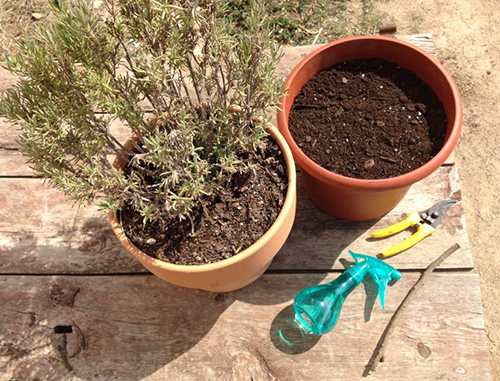
Softwood cuttings are taken from the new shoots that have grown since the break of winter and/or the start of spring, so for this reason, softwood cuttings should only be done in spring, and depending on your climate, early summer.
Hardwood cuttings do best in early fall but they will also work in spring and possibly early summer in mild climates, bearing in mind that hardwood cuttings tend to be more difficult to root compared to softwood cuttings.
When to Take Lavender Cuttings
Both hardwood and softwood cuttings are best taken when the shoot you intend to cut off the parent plant is about 4 inches (10 cm) long. In spring, this is usually just before the flower buds start to form, but if flowers have already developed on the parent plant, then make sure to remove them from your cutting.
The first thing you should do is fill your pots with potting mix and give it a pre-water. Collect your rooting powder or extract and a pencil or a stick.
Sterilize your garden shears or knife and grab yourself a small bucket or container filled with an inch of water (or even better, filled with your own DIY rooting extract ).
Now you are ready to take some cuttings.
Method for Taking Lavender Cuttings
Step 1. Look for a straight shoot that is about 4 inches (10 cm) long and has fresh new grey/green growth, especially on the tips. Choose a shoot that doesn’t have any branching.
Step 2. Cut the shoot at a 45-degree angle from the parent plant to make your lavender cutting. For softwood cuttings, the parent plant is simply getting a bit of a prune. But for hardwood cuttings, make your initial cut from the parent plant just above a fork, as this should allow the plant to regenerate without too much dead wood being left behind. You can then trim off any excess from your new cutting in the next step. Place your cutting in a container with a bit of water to prevent it drying out.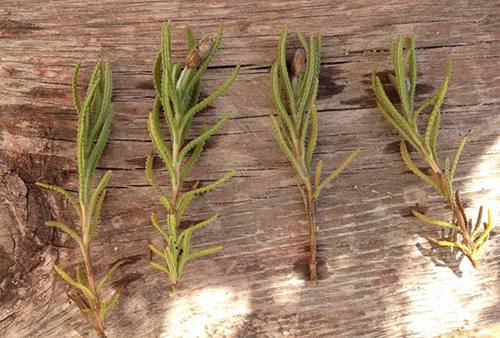
Step 3. Remove the lower ¾ of the leaves from your cutting but try not to damage any of the nodes along the stem since this is where new roots will grow from. Pinch off the very tip of the cutting at a healthy node and remove any flower buds. Make sure 1 – 2 nodes and their associated leaves are left intact on top.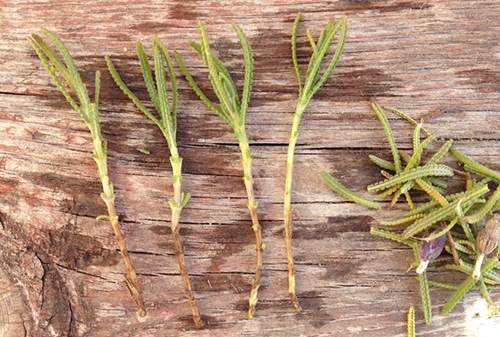
Step 4. Dip the lower quarter of the cutting in rooting powder, diluted honey, aloe vera, cinnamon powder or submerge the whole cutting in your DIY rooting extract for 10 – 20 minutes to encourage new roots to generate.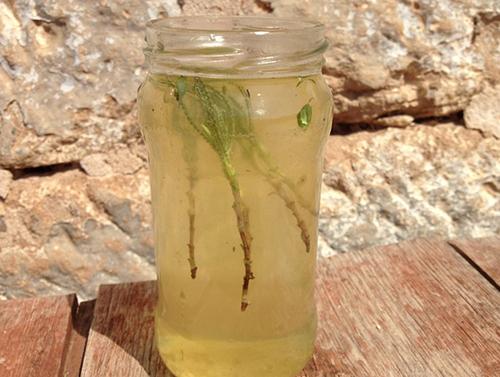
Step 5. With a pencil or stick, create a few small holes in your potting mix approximately a quarter of the length of your cutting; so, about an inch deep. This will ensure 2 – 3 nodes are under ground. I get a greater success rate with a few cuttings around the edge of a larger pot rather than a single cutting in a small pot. Not sure why… It’s just my personal experience.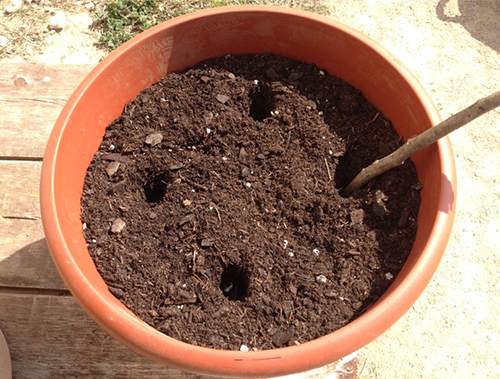
Step 6. Place the cutting into the hole so that 2 – 3 nodes are underground and gently fill it in. Once you have all of your cuttings in the pot water with a spray bottle.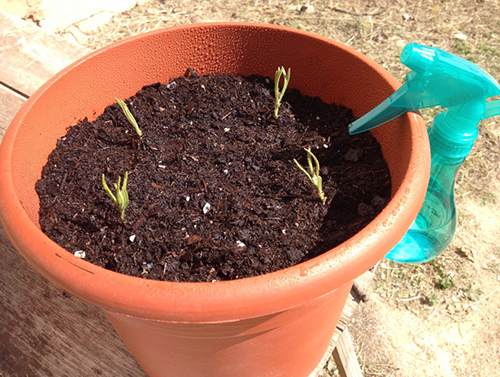
Step 7. Place the pot in a warm location but out of direct sunlight and wind. You can also cover your cuttings with a plastic bag or bottle to increase the humidity and temperature. Spray them with water a little every day for the next 3 – 4 weeks.
Within 4 weeks you should be able to see how successful your cuttings are and then in another 4 weeks you can either plant them in the ground, or put them in bigger pots, depending on how the season is going. I’m sure it will be more successful than germinating seed.
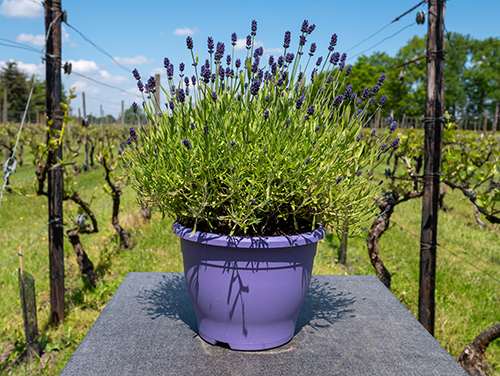
This shrub is often referred to as a multipurpose plant and there is a good reason as it has an array of well-being applications. Lavender is used to producing oil/essential oil, powder used in capsules/supplements, teas, and dried flowers in cushions, pillows, or sachets.
These are used to:
- Induce sleep
- Promote calm by reducing anxiety
- Treat mild pain
- Improve skin conditions such as acne, eczema, and mild sunburn
- Ease the inflammation caused by arthritis and rheumatism
- Lower blood pressure
- Reduce asthma symptoms
- Ease hot flushes associated with menopause
- Promote hair growth
- Combat fungal infections such as athlete’s foot.
How To Make a Whipped Lavender Cream
10 Plants That You Should Never Plant Together (Video)
Soak Your Troubles Away with Homemade Tub Tea


Do you sell mugwort? I’ve been looking for seeds or plants to grow, but would also like some dried mugwort. I live in Nova Scotia, Canada. Thanks for any help you can give me!
Mountain Rose Herbs
I just purchased some, which look awesome
Have you tried the petri dish method of starting seeds? Search that on Youtube. It works great.
Much too time consuming for me. As the flower head dies down& turns brown, I just nip it off with my finger& thumb then push into the ground ,thumb nail deep,under the mother bush. Later use a trowel to replant where ever. My Gran done this.